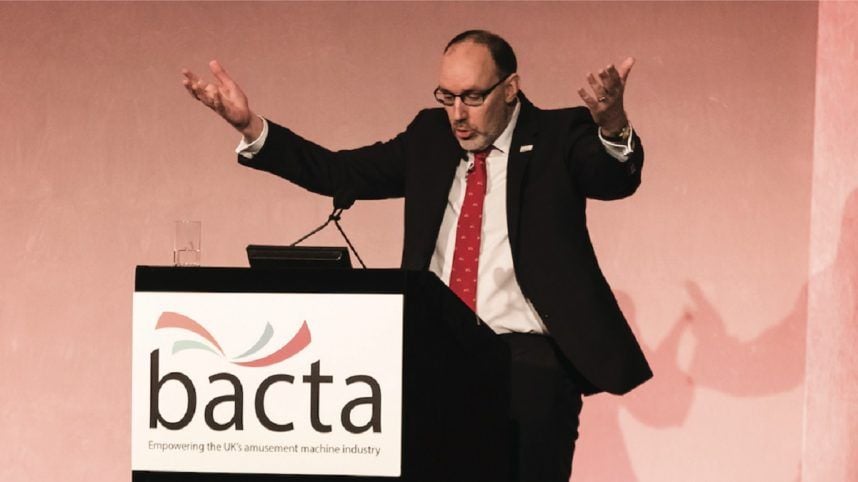Brexit Strangled the UK Gaming Employment Sector: Bacta CEO John White
Posted on: July 27, 2023, 08:10h.
Last updated on: July 27, 2023, 12:06h.
Brexit has served as a catalyst for limited growth in the UK gambling sector. This is the assertion of John White, the CEO of the gaming machine industry trade association Bacta, as he tries to get the UK government to lend the industry a hand.

The UK’s departure from the European Union meant that free travel between the two came to a halt. As a result, many people from other countries had to abandon their employment in the UK and return home.
That, coupled with COVID-19, has hurt the UK gaming sector’s workforce, according to White. He believes the best way to counter the problem is for the government to relax its tight control on visas and other restrictions.
Sending Out an SOS
White explained in a recent interview that recruitment and retention in the gaming and hospitality segments continue to be issues for Bacta members. He asserts that Brexit is partially to blame, as is wage inflation. Increases in inflation “come off the bottom line,” because low-stake gaming operators don’t have the margins to pass on costs to their users.
The UK’s Office for National Statistics reported in June that the average regular pay for employees increased by 7.2% between February to April of this year. This is the largest increase received, except for the 7.3% rise that occurred from April to June 2021 during COVID-19.
At the same time, the inflation rate for June was 8.95%, and 8.68% a month earlier. This puts the average pay still below the increased prices of most goods and services.
The result, according to White, is the UK becoming unattractive to non-UK workers. Coupled with the difficulty of securing a work visa and the cost of living, moving to the UK for a job no longer holds any appeal.
The necessary response is for the government to put the gaming and hospitality sectors on its “shortage occupations list.” As the name implies, a shortage occupation is one where there is a shortage of workers in a particular field.
That list is already extensive. It currently includes workers such as chemical scientists in the nuclear industry, health services and public health managers, civil and electrical engineers, care workers, and more.
Being on the list helps ensure certain salary levels, depending on the field. It also, in most circumstances, reduces the cost of applying for a work visa.
Too Soon to Tell
The UK’s recently released gambling white paper includes provisions for the distribution of gaming machines. Essentially, while casinos were given a pass, smaller venues, like bingo parlors and gaming arcades, possibly face significant changes in their allotments.
A couple of weeks ago, Bacta conducted a study to determine what its members thought of the changes. The results showed that the reductions could lead to a 10% cut in the number of Category C options, and a 20% drop in Category D options. Category C machines have a maximum stake of £1 (US$1.29). For Category D, which includes “claw” or crane machines, it’s also £1.
White added that when Bacta published the results, “We believe that there will be further reductions in overall numbers as machines reach obsolescence and the lack of player demand means there’s no value in retaining them. A drop in machine numbers will result in reduced demand for electricity, which is positive news for operators and for the environment.”
Therefore, it might be too soon to consider the shortage occupations list suggestion. A reduction in gaming machines available, even if other machines come online, will likely lead to some operators pulling out of the space. While other areas of the segment will need to shore up their workforce complements, it might become easier for existing workers to find new jobs.
Overall, there’s still a need to find more qualified employees. The UK’s unemployment rate, according to the Office for National Statistics, was at 4% between March to May. This is the highest it’s been in a year, but it’s still lower than the high mark of 5.2% from 2021 and 8.7% from 2013.
Related News Articles
Gambling and Crime Linked In UK Study, but Regulators Find Survey Flaws
UK Lawmaker Slams ‘Out of Control’ UK Gambling Commission
GGPoker Secures Sponsorship for the UK Poker Championships in January
Most Popular
Mega Millions Reportedly Mulling Substantial Ticket Price Increase
NoMad Hotel to Check Out of Park MGM on Las Vegas Strip
VEGAS MYTHS BUSTED: To ‘86’ Someone Was Vegas Mob Slang for Murder
Most Commented
-
End of the Line for Las Vegas Monorail
— April 5, 2024 — 90 Comments -
Mega Millions Reportedly Mulling Substantial Ticket Price Increase
— April 16, 2024 — 8 Comments -
Long Island Casino Opponents Love New York Licensing Delays
— March 27, 2024 — 5 Comments
















No comments yet